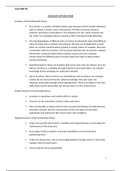Summary
Summary SED2601 EXAM NOTES
- Course
- Institution
- Book
Exam notes for SED2601. Valuable notes on theories, ecological systems, diversity (gender,race and class), citizenship in education etc. Please study glossary pg 95 to 102 as well and work through assignments.
[Show more]




